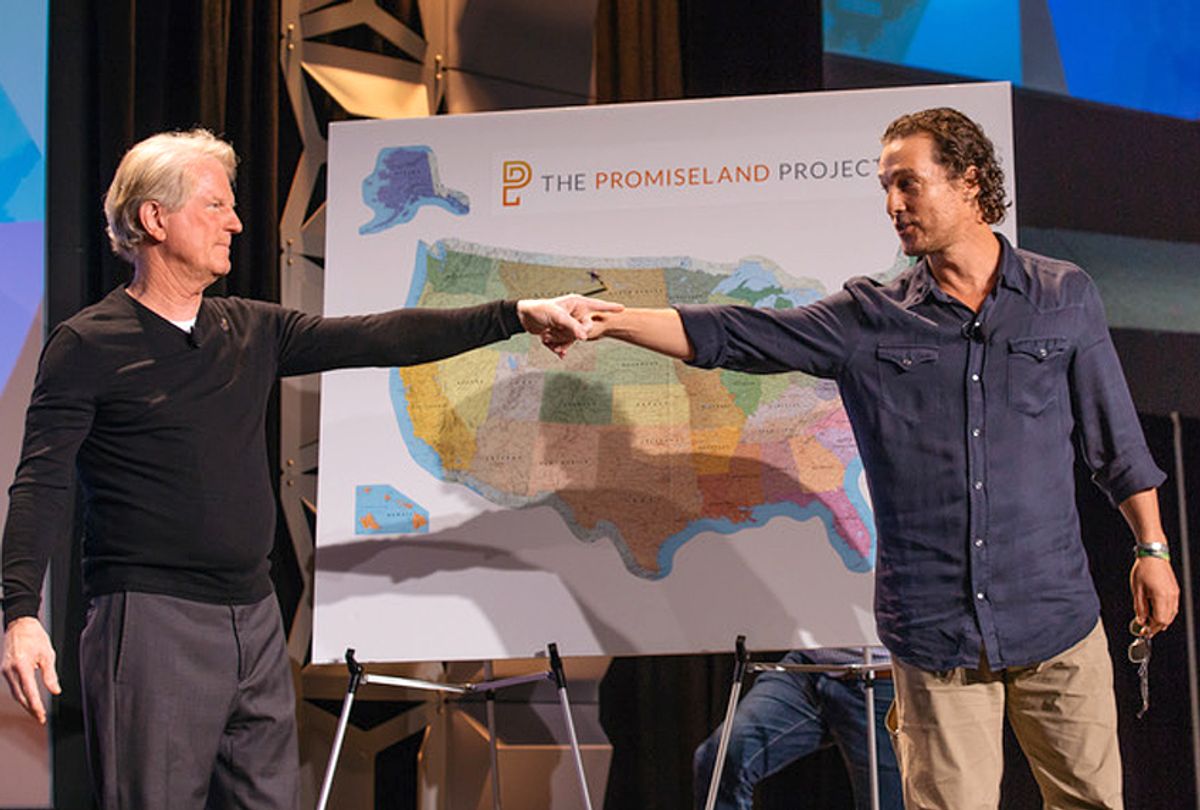The following is sponsored content from CMO Moves, a podcast that shares the human side of game-changing CMOs and leaders:How did they get to the top? What rules did they have to break along the way? What inspires them? What tips can they now pass along? Tune in to the podcast to hear inspiring career-advice and the personal success stories behind these incredible marketing leaders.
In the 1970s, when Roy Spence was just 20 years old, he walked into Citibank in Austin, Texas with his hair in a ponytail and wearing a tie-dyed shirt to ask for a $5,000 loan to launch an advertising firm with three college friends. When the loan officer asked about his business plan, Spence responded that he "wanted to make a difference, and to get really rich."
Spence got the loan. Fast forward more than 45 years, and Roy is Co-Founder and Chairman of GSD&M, a leading marketing communications and advertising company, and Co-Founder and CEO of The Purpose Institute.
In 1985, Spence was one of the forces behind the "Don't mess with Texas" campaign, an anti-littering campaign that slashed the civic scourge by 79 percent in four years. "We went, wait a minute, what did we do here? It was not regulations. There weren't fines. We just changed the culture of Texas through marketing," said Spence in a conversation for the CMO Moves podcast. "And we realized at that moment we weren't in the litter business, we were in the pride business. That's when we launched purpose-based branding, and that led me to start The Purpose Institute, where we help people, companies and, hopefully, countries, rediscover their purpose."
Spence's personal lessons in finding his purpose started at an early age in his hometown of Brownwood, Texas. His mom, Ruth Griffin, a teacher, offered him a valuable insight about his school papers, which demonstrated spelling was not a strong point for him but that he excelled in his ability to write and tell stories. "At 14 years old, my mom looks at me in our little kitchen and said, 'I don't want you to spend another second of your life trying to be average at what you're bad at. I want you to spend the rest of your life trying to become great at what you're good at,'" Spence recalls.
"That changed my life," he said.
His older sister, Susan Spence, also inspired him to live a purpose-driven life. She was born with spina bifida in an era when babies born with the birth defect weren't supposed to live past their first birthday, yet she lived to be 49 years old. As a child, he'd push her home from school in her wheelchair. As they grew, he'd push her around her community college and, later in life when she moved closer to him and his wife, around their neighborhood every Sunday. "I thought I was pushing her, but the whole time she'd been pushing me," Roy said. "She always used to say, 'You don't have to have legs to fly.'"
Those early lessons from his family drove him to focus on his strengths and on making an impact on the people around him. He now applies that strategy to his work. Spence believes great companies, like great people, are driven by purpose, the "definitive difference you're trying to make in the world."
Because he says the chief marketer has to become the champion of finding purpose and marketing purpose, Spence wants to recast the role of chief marketing officer as chief purpose officer.
Further, identifying a brand's purpose helps build company culture around that core. "I call them love cultures," Spence said. "Love is hard, but let me tell you what love cultures do. Number one, you have people loving what they do every day . . . Number two, people not only love what they do, they love whom they are doing it with. They do it because they're playing to their strengths. In a love culture, you also love the positive impact you make every day, not only on your customer's life, but in . . . your community's life and your nation's life. Marketing can do all of this."
While Spence has worked with big name clients such as Walmart, NBCUniversal, Whole Foods and Southwest Airlines, he says he is taking on America as his next client with the launch of The Promiseland Project, a long-term marketing and grassroots campaign to unleash the power of purpose as an antidote to the ceaselessly growing cultural divide in America.
"Marking people know right now that the only messaging Americans are getting is the political divisive messages on all sides of us versus them. We are in a cultural war . . ." said Spence. "I decided to take America as my client, pro bono, to market the best of America to America," he said. "We have to find common ground, and higher ground marketing can do that because we can control a positive, enlightening message."
Spence believes that marketing needs to be elevated to its rightful place so positive messages of purpose can be spread throughout our culture. And he says that purpose is built into the younger generations' DNA.
"I don't believe America was built for our young people to be standardized. I think we were built to be extraordinary," said Spence. "We've got to get a whole new generation of Americans to go into marketing," said Spence in CMO Moves. "Marketing has the ability to be a powerful force for good — not only good within their own organization, but also uniting behind opportunities to improve lives and improve America."
His message to the young people of America? If you want to be in the business of creating the future, marketing isn't a bad place.
To hear more of Roy Spence's powerful story and inspirational advice, listen to the CMO Moves podcast here.



Shares